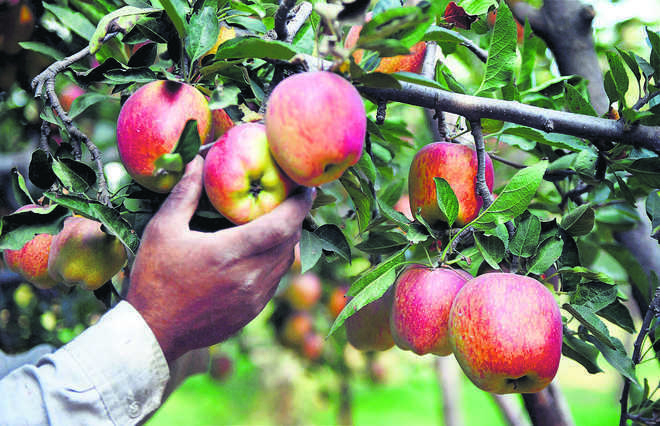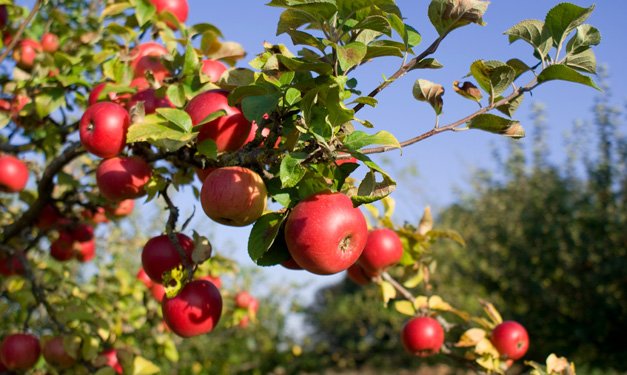Apple has excellent health benefits, hence it is recommended for daily consumption. Apples were originated in Europe and Western Asia and spread across the world. Seed grown apple trees are large in size when compared to root stock (grafted onto roots). Apple tree belongs to the family of “Rosaceae” and genus of “Malus”. There are more than 8000 varieties/cultivars of apple all over the world.
The apple is a deciduous tree which can grow up to 15 to 16 feet tall. The wild apple trees can reach up to 40 feet. However, the size and shape of the apple tree are determined by root stock selection and trimming (Pruning) method.
Soil, climate and orchard management practices are common factors that influence the commercial farming of apple fruit. Apples can be eaten raw or used as an important ingredient in many desserts like apple pie, apple crumble, apple crisp and apple cake apart from using in beverages (ciders and juices . One can go for high density apple plantation for getting more yields.
Climate (Temperature and sunshine) is the main factor that affects development of apple fruits. Usually, apple trees require certain minimum chilling period for optimum growth and quality fruiting. It is recommend having 1000 chilling hours at below 7°C for best growth and yield. These conditions depend on the cultivar. However, extreme cold temperature will damage the apple crop. Abundant sunshine is required in growing apples since it is responsible for good fruit colour development. Apples can be cultivated at 1500 to 2600 meter above mean sea level (msl). Apple orchard requires on an average 20°C to 25°C during growing period along with 100 to 130 cm evenly distributed annual rainfall. Heavy rain fall or fog during fruit maturity will result in improper apple fruit development. Avoid growing apples in areas where heavy winds are expected.
Apples can be grown in most of the soils. However, the best suitable soils are well-drained deep loamy soils rich in organic matter having pH value 5.5 to 6.5 with good aeration. Commercial apple growers should go for soil test and based on test results, any micro-nutrient gaps in soil should be incorporated.

For planting, dig the pits of size 1 meter x 1 meter x 1 meter. Mixture of well decomposed farm yard manure (FMY) of 35 kg and 500 grams of single super phosphate and 50 grams of malathion dust should be incorporated in each pit. Carry out irrigation immediately after planting is done.
Mulching provides the way of conserving moisture at plant base and also checks the weed growth surrounding of apple trees. Plastic mulch or any other natural mulch material like hay, dry leaves or dry grass can be used.
The most common diseases found in apple farming are sclerotius blight, collar rot, apple scab, cankers and crown gall.
Pests that sometimes attack apples include: aphids, apple tree borers, apple fruit worms, apple leaf miners, apple maggots, birds, Codling moths, European apple sawflies, European red mites, flathead borers, roundhead borers, leaf rollers, oriental fruit moths, plant bugs, plum curculio, scale, spider mites, tarnished plant bugs, tortrix moths, wasps, white apple leafhoppers, winter moths.
Selecting disease resistant and quality rootstocks can prevent most of these diseases. However, destroying infected apple plants and using chemicals like carbendazim, mancozeb and other fungicides is effective in controlling these diseases.





